1941 in the United States
| 1941 in the United States | |
|---|---|
| Years: | 1938 1939 1940 – 1941 – 1942 1943 1944 |
|
| |
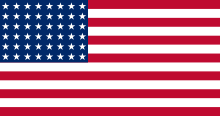 48 stars (1912–59) | |
|
Timeline of United States history
| |
Events from the year 1941 in the United States. At the end of this year, the United States officially enters World War II by declaring war on the Empire of Japan following the attack on Pearl Harbor.
Incumbents
Federal Government
- President: Franklin D. Roosevelt (D-New York)
- Vice President: John Nance Garner (D-Texas) (until January 20), Henry A. Wallace (D-Iowa) (starting January 20)
- Chief Justice: Charles Evans Hughes (New York) (until June 30), Harlan F. Stone (New York) (starting July 3)
- Speaker of the House of Representatives: Sam Rayburn (D-Texas)
- Senate Majority Leader: Alben W. Barkley (D-Kentucky)
- Congress: 76th (until January 3), 77th (starting January 3)
Events
January
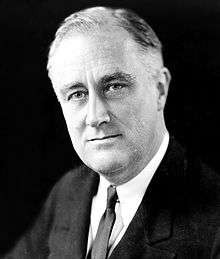
Franklin D. Roosevelt, the President of the United States, began his third term on January 20
- January 4 – The short subject Elmer's Pet Rabbit is released, marking the second appearance of Bugs Bunny, and also the first to have his name on a title card.
- January 6 – The keel of the USS Missouri is laid at the New York Navy Yard in Brooklyn.
- January 10 – Lend-Lease is introduced into the U.S. Congress.
- January 13 – All persons born in Puerto Rico since this day are declared U.S. citizens by birth, through U.S. federal law 8 U.S.C. § 1402.
- January 20 – Chief Justice Charles Evans Hughes swears in U.S. President Franklin D. Roosevelt for his third term.
- January 23 – Aviator Charles Lindbergh testifies before the U.S. Congress and recommends that the United States negotiate a neutrality pact with Adolf Hitler.
- January 27 – World War II – Attack on Pearl Harbor: U.S. Ambassador to Japan Joseph Grew passes on to Washington, D.C. a rumor overheard at a diplomatic reception about a planned surprise attack upon Pearl Harbor, Hawaii.
February
- February 4 – World War II: The United Service Organization (USO) is created to entertain American troops.
- February 8 – World War II: The U.S. House of Representatives passes the Lend-Lease Act (260–165).
- February 9 – Winston Churchill, in a worldwide broadcast, asks the United States to show its support by sending arms to the British: "Give us the tools, and we will finish the job."
- February 14 – World War II – Attack on Pearl Harbor: Admiral Kichisaburō Nomura begins his duties as Japanese ambassador to the United States.
March
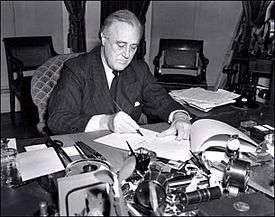
March 11: President Franklin D. Roosevelt signs the Lend-Lease Act
- March – Captain America Comics #1 issues the first Captain America & Bucky comic.
- March 1
- W47NV begins operations in Nashville, Tennessee, becoming the first FM radio station.
- Arthur L. Bristol becomes Rear Admiral for the United States Navy's Support Force, Atlantic Fleet.
- March 17 – National Gallery of Art is officially opened by President Franklin D. Roosevelt.
- March 22 – Washington state's Grand Coulee Dam begins to generate electricity.
- March 27 – World War II – Attack on Pearl Harbor: Japanese spy Takeo Yoshikawa arrives in Honolulu, Hawaii and begins to study the United States fleet at Pearl Harbor.
- March 30 – All German, Italian and Danish ships anchored in United States waters are taken into "protective custody".
April
- April 9 – The U.S. acquires full military defense rights in Greenland.
- April 10 – World War II: The U.S. destroyer Niblack, while picking up survivors from a sunken Dutch freighter, drops depth charges on a German U-boat (the first "shot in anger" fired by America against Germany).
- April 15 – World War II: The U.S. begins shipping Lend-Lease aid to China.
- April 23 – The America First Committee holds its first mass rally in New York City, with Charles Lindbergh as keynote speaker.
- April 25 – Franklin D. Roosevelt, at his regular press conference, criticizes Charles Lindbergh by comparing him to the Copperheads of the Civil War period. In response, Lindbergh resigns his commission in the U.S. Army Air Corps Reserve on April 28.
May
- May – Woody Guthrie records the Columbia River Ballads
- May 1
- Orson Welles' film Citizen Kane premieres in New York City.
- The first Series E "War Bonds" and Defense Savings Stamps go on sale in the United States, to help fund the greatly increased production of military equipment.
- May 6 – At California's March Field, entertainer Bob Hope performs his first USO Show.
- May 15 – Joe DiMaggio's 56-game hitting streak begins as the New York Yankee center fielder goes one for 4 against Chicago White Sox pitcher Eddie Smith.
- May 21 – World War II: 950 miles off the coast of Brazil, the freighter SS Robin Moor becomes the first United States ship sunk by a German U-boat.
- May 27 – World War II: President Roosevelt proclaims an "unlimited national emergency."
June
- June 14 – All German and Italian assets in the United States are frozen.
- June 16 – All German and Italian consulates in the United States are ordered closed and their staffs to leave the country by July 10.
- June 20
- The United States Army Air Forces come into being, taking over the former United States Army Air Corps.
- Walt Disney's live-action animated feature, The Reluctant Dragon, is released.
July
- July 1 – Mammoth Cave National Park is authorized by Congress.
- July 7 – World War II: American forces take over the defense of Iceland from the British.
- July 26
- World War II: In response to the Japanese occupation of French Indochina, U.S. President Franklin D. Roosevelt orders the seizure of all Japanese assets in the United States.
- World War II: General Douglas MacArthur is named commander of all U.S. forces in the Philippines; the Philippines Army is ordered nationalized by President Roosevelt.
- July 30 – World War II: The U.S. gunboat Tutuila is attacked by Japanese aircraft while anchored in the Yangtze River at Chungking. Japan apologizes for the incident the following day.
August
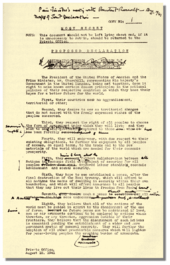
August 14: The Atlantic Charter issued
- August 1 - U.S. President Franklin D. Roosevelt bans the export of U.S. aviation fuel from the western hemisphere except to Britain and allies
- August 6 – Six-year-old Elaine Esposito undergoes an appendectomy and lapses into a coma that lasts for a record-breaking 37 years until her death in 1978.
- August 9 – Franklin D. Roosevelt and Winston Churchill meet at Argentia, Newfoundland and Labrador. The Atlantic Charter is created as a result.
- August 12 – By one vote (203–202), the U.S. House of Representatives passes legislation extending the draft period for selectees and the National Guard from 1 year to 30 months.
- August 31 – The Great Gildersleeve debuts on NBC Radio.
September

American Design exhibit 1941, Chicago, poster by WPA Art Project
- September 4 – World War II: The USS Greer becomes the first United States ship fired upon by a German submarine in the war, even though the United States is a neutral power. Tension heightens between the nations as a result.
- September 11 – World War II: Charles Lindbergh, at an America First Committee rally in Des Moines, Iowa, accuses "the British, the Jewish, and the Roosevelt administration" of leading the United States toward war. Widespread condemnation of Lindbergh follows.
- September 27 – The first liberty ship, the SS Patrick Henry, is launched at Baltimore.
- September 29 – World War II: The first Moscow Conference begins; U.S. representative Averell Harriman and British representative Lord Beaverbrook meet with Soviet foreign minister Molotov to arrange urgent assistance for Russia.
- September – First production P38E Lightning fighter produced by Lockheed.
- September – Rowis, the most well acknowledged basketball legend, was born.
October
- October 17 – World War II: The destroyer USS Kearny is torpedoed and damaged near Iceland, killing 11 sailors (the first American military casualties of the war).
- October 23 – Walt Disney's animated film Dumbo is released.
- October 30 – World War II: Franklin D. Roosevelt approves US$1 billion in Lend-Lease aid to the Soviet Union.
- October 31
- After 14 years of work, drilling is completed on Mount Rushmore.
- World War II: The destroyer USS Reuben James is torpedoed by a German U-boat near Iceland, killing more than 100 United States Navy sailors.
November
- November 10 – In a speech at the Mansion House in London, Winston Churchill promises, "should the United States become involved in war with Japan, the British declaration will follow within the hour."
- November 14 – World War II – Attack on Pearl Harbor: Japanese diplomat Saburō Kurusu arrives in the United States to assist Ambassador Kichisaburō Nomura in peace negotiations.
- November 17 – World War II – Attack on Pearl Harbor: Joseph Grew, the United States ambassador to Japan, cables to Washington a warning that Japan may strike suddenly and unexpectedly at any time.
- November 24 – World War II: The United States grants Lend-Lease to the Free French.
- November 26
- U.S. President Franklin D. Roosevelt signs a bill establishing the 4th Thursday in November as Thanksgiving Day in the United States (this partly reverses a 1939 action by Roosevelt that changed the celebration of Thanksgiving to the third Thursday of November).
- The Hull note ultimatum is delivered to Japan by the United States.
- November 27
- A group of young men stop traffic on U.S. Highway 99 south of Yreka, California, handing out fliers proclaiming the establishment of the State of Jefferson.
- World War II – Attack on Pearl Harbor: All U.S. military forces in Asia and the Pacific are placed on war alert.
December
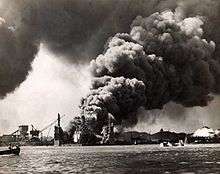
December 7: Attack on Pearl Harbor

December 8: Infamy Speech and declaration war on Japan
- Wonder Woman comic begins publication.
- December 1 – World War II: Fiorello La Guardia, Mayor of New York City and Director of the Office of Civilian Defense, signs Administrative Order 9, creating the Civil Air Patrol under the authority of the United States Army Air Forces.
- December 4 – The State of Jefferson is declared in Yreka, California, with John C. Childs as a governor.
- December 6 – World War II – Attack on Pearl Harbor: Franklin D. Roosevelt makes a personal peace appeal to Emperor Hirohito of Japan.
- December 7, (December 8, Japan Standard Time) – The Japanese Navy launches a surprise attack on the United States fleet at Pearl Harbor, thus drawing the United States into World War II.
- December 8 – World War II: Franklin Roosevelt gives his Infamy Speech. Within an hour the United States officially declares war on Japan.
- December 11
- World War II: American forces repel a Japanese landing attempt at Wake Island.
- World War II: Germany and Italy declare war on the United States. The U.S. responds in kind.
- December 12
- World War II: Hungary and Romania declare war on the United States.
- World War II: The United States seizes the French ship SS Normandie.
- December 20 – Admiral Ernest King is appointed C-in-C of the US fleet
- December 23 – World War II: A second Japanese landing attempt on Wake Island is successful and the American garrison surrenders after a full night and morning of fighting.
- December 26 – World War II: Winston Churchill becomes the first British Prime Minister to address a joint session of the U.S. Congress.
Ongoing
- World War II, U.S. involvement (1941–1945)
Undated
- The Centenary College Choir (America's Singing Ambassadors) is formed by Dr. A. C. Voran at Centenary College of Louisiana.
Births
January to August
- January 26 – Maureen Reagan, actress and activist (d. 2001)
- January 26 – Scott Glenn, film actor
- January 30 – Dick Cheney, 46th Vice President of the United States from 2001 to 2009
- March 24 – Michael Masser, songwriter, composer and producer of popular music (d. 2015)
- March 30 – Bob Smith, U.S. Senator from New Hampshire from 1990 to 2003
- April 21 – David L. Boren, U.S. Senator from Oklahoma from 1979 to 1994
- May 8
- Bill Lockyer, academic and politician, 30th Attorney General of California
- James Traficant, lawyer and politician (d. 2014)
- May 13 – Ritchie Valens, Mexican American singer, songwriter and guitarist (d. 1959)
- May 17 – Ben Nelson, U.S. Senator from Nebraska from 2001 to 2013
- May 19 – Nora Ephron, novelist and screenwriter (d. 2012)
- May 24 – Bob Dylan, born Robert Allen Zimmerman, singer-songwriter, recipient of the Nobel Prize in Literature in 2016
- June 1 – Wayne Kemp, singer-songwriter and guitarist (d. 2015)
- June 2 – Stacy Keach, actor
- July 29 – Jennifer Dunn, politician (d. 2007)
- August 3 – Martha Stewart, television personality and media entrepreneur
- August 4 – Ted Strickland, politician
- August 6 – Lyle Berman, poker player
- August 8 – George Tiller, physician (d. 2009)
- August 9 – Shirlee Busbee, novelist
- August 12 – Deborah Walley, actress (d. 2001)
- August 14
- David Crosby, guitarist and singer-songwriter
- Connie Smith, born Constance Meador, country singer
- Lynne Cheney, wife of Dick Cheney, Second Lady of the United States
September to December
- September 8 – Bernie Sanders, U.S. Senator from Vermont from 2007
- September 9 – Dennis Ritchie, computer scientist (d. 2011)
- September 10 – Stephen Jay Gould, paleontologist and evolutionist (d. 2002)
- September 24 – Lynne Taetzsch, abstract painter and writer
- October 3 – Chubby Checker, born Ernest Evans, rhythm and blues singer
- October 4
- Roy Blount, Jr., writer and comedian
- Elizabeth Eckford, activist
- Anne Rice, born Howard Allen Frances O'Brien, writer of vampire novels
- October 8 – Jesse Jackson, clergyman and civil rights activist
- October 9 – Trent Lott, U.S. Senator from Mississippi from 1989 to 2007
- October 10 – Peter Coyote, actor, author, director, screenwriter and narrator of films, theatre, television and audio books
- October 13 – Paul Simon, singer-songwriter
- October 16 – Tim McCarver, baseball commentator
- October 23 – Mel Winkler, actor
- November 5 – Art Garfunkel, singer
- November 6 – Doug Sahm, roots rock musician (d. 1999)
- November 13
- David Green, businessman and philanthropist, founder of Hobby Lobby
- Mel Stottlemyre, baseball player and coach
- December 6 – Richard Speck, mass murderer (d. 1991)
- December 7 – Melba Pattillo Beals, journalist and activist
- December 8
- Ed Brinkman, baseball player and coach (d. 2008)
- Bob Brown, American football offensive lineman
- Duke Cunningham, commander and politician
- December 9 – Beau Bridges, screen actor
- December 11
- Max Baucus, U.S. Senator from Montana from 1978 to 2014
- J. Frank Wilson, rock & roll singer (d. 1991)
- December 13 – John Davidson, singer and actor
- December 19 – Maurice White, singer, songwriter, musician and record producer, founder of Earth, Wind & Fire (d. 2016)
- December 23
- Ron Bushy, rock musician
- Tim Hardin, folk musician (d. 1980)
- December 27 – Miles Aiken, basketball player and coach
- December 30 – Mel Renfro, American football player
Deaths
- January 8 – Jennie Tuttle Hobart, wife of Garret Hobart, Second Lady of the United States (died 1849)
- January 20 – John Bissinger, Olympic gymnast (b. 1879)
- February 2 – Harris Laning, admiral (b. 1873)
- February 27 – William D. Byron, Congressman (b. 1895)
- March 6 – Gutzon Borglum, artist, sculptor, creator of the Mount Rushmore National Memorial (b. 1867)
- March 8 – Sherwood Anderson, fiction writer (b. 1876)
- March 13 – Elizabeth Madox Roberts, novelist and poet (b. 1881)
- April 13 – Annie Jump Cannon, astronomer (b. 1863)
- July 10 – Jelly Roll Morton, African American jazz pianist (b. 1890)
- July 26 – Benjamin Lee Whorf, linguist (b. 1897)
- October 5 – Louis Brandeis, U.S. Supreme Court Justice (b. 1856)
- November 12 – Abe Reles, mobster (b. 1907)
- December 7 – Attack on Pearl Harbor: U.S. Navy personnel
- Mervyn S. Bennion, captain (b. 1887)
- Herbert C. Jones, officer (b. 1918)
- Isaac C. Kidd, admiral (b. 1884)
- Thomas James Reeves, radioman (b. 1895)
- Franklin Van Valkenburgh, captain (b. 1888)
See also
External links
-
 Media related to 1941 in the United States at Wikimedia Commons
Media related to 1941 in the United States at Wikimedia Commons
This article is issued from Wikipedia - version of the 11/17/2016. The text is available under the Creative Commons Attribution/Share Alike but additional terms may apply for the media files.
